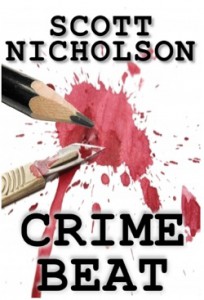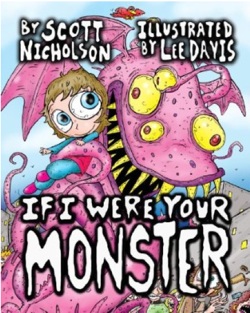 Today, we have an interview with Scott Nicholson, the author of thirteen novels and seven story collections, as well as the children’s book If I Were Your Monster. He sells a lot of ebooks, and he’s here to share some thoughts on advertising and how pricing may go in the future. He blogs at Indiereader.com, and you can find out more about his books at www.hauntedcomputer.com.
Today, we have an interview with Scott Nicholson, the author of thirteen novels and seven story collections, as well as the children’s book If I Were Your Monster. He sells a lot of ebooks, and he’s here to share some thoughts on advertising and how pricing may go in the future. He blogs at Indiereader.com, and you can find out more about his books at www.hauntedcomputer.com.
Do you want to start out telling us about your ebooks and how long you’ve been e-publishing?
I actually dabbled in e-books about six or seven years back through Fictionwise, and after getting a check for $5 every six months, I concluded it was a waste of time. I didn’t change my opinion until late 2009, when I started reading more about the Kindle and was stuck in my career and looking for new challenges. I uploaded my first Kindle book at the very end of 2009, so it’s been just over a year of serious commitment. As the year went on, I entered indie publishing more and more deeply because of the numerous advantages over the old way.
You’ve got several ebooks, all doing fairly well in the Amazon sales rankings. What have you done for promotion?
A little of everything. I try to stay active in various forums and communities, I write about indie publishing and writing, I buy ads like any business, and I study the field a lot. Really, there’s no magic bullet, just a lot of hard work. It helps when people like the books and tell their friends. That’s the best marketing of all, and I truly appreciate my friends and readers, because they create whatever success I have.
 You’ve written a bit about the future of advertising in ebooks. Would you like to talk about that? Do you see ebooks changing to more of a website model where content is given away for free and authors are paid via ad clicks or for sponsored placements?
You’ve written a bit about the future of advertising in ebooks. Would you like to talk about that? Do you see ebooks changing to more of a website model where content is given away for free and authors are paid via ad clicks or for sponsored placements?
Honestly, I am a little concerned about the rapid plummeting in ebook prices. But maybe “concerned” is not the right word, because the market creates itself and will resolve itself, and it’s not my problem. All I can do is anticipate and react.
Last year, I predicted that standard ebook prices would be 99 cents by 2015, but now I think it may happen as early as 2012. I mean most fiction works, the stuff that normally would have been mass market paperbacks. Technical books and non-fiction will have higher value and less competition, though a smaller audience in general.
Now I see the ad model coming rapidly, where authors need the downloads to get paid. Clearly that’s where Google wants to take it. And now I may alter my prediction and say that by 2015, most ebooks will be free. I am not sure what this will mean for authors, but I predict a lot of them are going to quit writing, especially the lazy ones who just dragged out their slush pile when the Kindle craze started and never really had the creative passion. They just wanted to be superstars and make money.
If advertising in ebooks does become common place, do you think Kindle/Nook/etc. authors will be able to make money, or will the retailers monopolize things?
Well, the people distributing the books will still need content, so if it’s not worth the writer’s time to spend a year on a novel, you’re either going to get crap (the books people are already giving away for free) or else there will be only a few big powerhouse “names” left. And by “names,” I mean what was already happening in bestselling fiction, where a dozen or so brand-name authors were farmed out, with ghostwriters churning away in the factory. It’s lazy and it’s crap and it contributed to New York’s demise, but I’m not sure what they could have done differently to survive.
And, yes, they are dead, they just don’t know it yet.
So writers need to stay flexible and creative and distributors better make it worth the writers’ time. In other words, if you think things have changed a lot in the last two years, better fasten your seatbelt, because we’ve barely found the pedal on this rocket.
You run the “Indie Books Blog” too. Would like tell us a bit about that? How are you choosing authors you feature?
It’s a labor of love. I know how hard it is to get attention in this crowded arena, so it’s my way of giving back. The theme is “We’re All In It Together,” with the idea that we all promote each other. Some get it, some don’t. I post about one book a day, in the order they are submitted. I may go to paid sponsorships at some point but that would mean working to build it up, and the idea now is the community builds itself. If the community wants it, it will work. If not, at least I planted the seed.
Thanks for visiting with us, Scott!
Thanks, Lindsay.




Thanks, Lindsay! Forgot to mention that I am featuring books in my ebooks–$5 per book per month–email me at hauntedcomputer At yahoo if interested.
Figure I better do that “anticipate and react” thing.
Scott
I may be alone but I don’t buy the 99 cent ebooks. I guess I perceive them as being of a lesser quality and the couple where I’ve downloaded samples haven’t done anything to disavow me of that idea.
I don’t think mainstream publishers can afford to sell books, even ebooks, that cheaply. I don’t know much about how advertising could work but it seems like an advertiser would have to pay a lot to cover what royalties are now and make things worth it for all involved.
I don’t think you are alone, Jen–and I think there’s another layer that doesn’t go as low as $2.99, under the notion that the higher prices protect them from bad books. A theory that does has some merit, but I have seen some absolutely awful indie books priced at $5 to $7–but the cover looks like a “real book,” so people dip for it. The line between “real publishers” and indie will be almost invisible by next year. Indeed, the only universally reliable difference is the much-higher prices.
And under my thinking, the current royalty structure won’t be the same–writers will be paid on bulk sales like Netflix movie makers or a contract for X dollars for the book to be available for “checking out” for X months.
.99 ebooks are a loss leader. This is no different than selling a gallon of milk for $1. It gets people in the door. It may not be a wise strategy when you only have one book to offer. When you have several, it makes sense to try it.
Sounds wise, Helen. I see people giving away free books thinking people will remember a year later when the new book comes out. Risky.
Scott